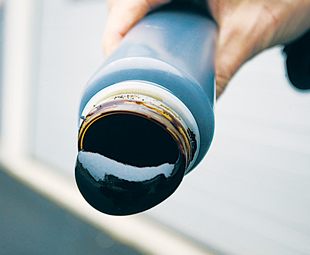From wood to wheel

In a joint project with organisations like the European Union, the Swedish Energy Agency, various fuel companies and the transport industry, Volvo Trucks recently launched a project aimed at establishing the viability of dimethyl ether (DME) as a biofuel.
In August of 2007, Volvo unveiled seven trucks that were each specifically designed to run on a different type of biofuel. All seven of the FM trucks were equipped with the company’s own 9-l engine that had been modified to illustrate the achievability of carbon-dioxide-free transport.
The seven trucks on display were each capable of running on a different form of biofuel that included biodiesel, biogas combined with biodiesel, ethanol and/or methanol, synthetic diesel, hydrogen gas combined with biogas and DME.
“The diesel engine is an extremely efficient energy converter that is perfectly suited to many different renewable fuels, liquid or gaseous,” stated Jan-Eric Sundgren, member of Volvo Group Management and senior vice president for public and environmental affairs, during the unveiling. “With our know-how in engine technology and our large volumes, we can manufacture engines for several different renewable fuels, and also create possibilities for carbon-dioxide-free transports in other product areas such as buses, construction equipment and boats.”
Volvo added, however, that the supply of renewable fuels was very limited and that the lack of large-scale production and distribution of these alternative fuels prevented the feasible implementation of any carbon-dioxide-free transport technology on a wide scale.
“With these vehicles, we have shown that Volvo is ready, that we possess the technology and the resources for carbon-dioxide-free transport, but we cannot do this alone,” said Leif Johansson, chief executive officer of the Volvo Group. “We also require large-scale production of renewable fuels and putting such production in operation requires extensive investments in research and development, and also well-defined, common guidelines from authorities in as many countries as possible.”
While Volvo produced seven different vehicles capable of running on seven different forms of renewable energy, this was merely done to emphasise the fact that a number of biofuel options was available. Investing in all these technologies on a large scale was never a realistic solution. The most viable option needed to be chosen, and focused on exclusively.
“We know that in the foreseeable future there will be insufficient biomass or renewable fuels to fully replace fossil fuels,” stated Sundgren. “That is why it is important that decisions on the production of future fuels are preceded by such comprehensive assessments – otherwise there is the risk that we focus on too many and quite simply unsuitable alternatives, which will delay the introduction of carbon-dioxide-free transport.”
With this in mind, it appears that Volvo and its partners will – for the next few years at least – focus specifically on DME.
It was announced in September this year that Volvo Trucks will be participating in a Bio-DME project that will see 14 Volvo FH trucks modified to run on DME, tested by transport companies in their daily activities at four locations in different parts of Sweden.
The project will run from 2010 until 2012 and will get underway early next year. The field tests will encompass the entire technological chain from biomass to fuel in trucks, including distribution and filling stations. To accomplish this, fuel company, Preem, will build filling stations where trucks can be refilled with DME. Other companies such as Delphi, ETC, Haldor Topsoe and Total will also be contributing to the project.
“We are now on our way to having all of the important pieces in place – production of Bio-DME, trucks that run on the fuel and a distribution network. Bio-DME will have a significantly positive effect on our environment in the future,” stated Jonas Rudberg, chief operations officer for Chemrec, during the project launch.
 The Bio-DME needed for the field test will be produced by a Chemrec plant adjacent to the Smurfit Kappa Kraftliner pulp plant in Pitea, Sweden and will produce around 4 t of biofuel per day. The raw material that will be used to produce the Bio-DME is black liquor, an energy-rich, highly viscous by-product of the pulp industry. Through gasification – the process whereby a raw material is reacted at high temperatures with a controlled amount of oxygen or steam – of the biomass in the black liquor, a particularly clean and energy-efficient fuel emerges.
The Bio-DME needed for the field test will be produced by a Chemrec plant adjacent to the Smurfit Kappa Kraftliner pulp plant in Pitea, Sweden and will produce around 4 t of biofuel per day. The raw material that will be used to produce the Bio-DME is black liquor, an energy-rich, highly viscous by-product of the pulp industry. Through gasification – the process whereby a raw material is reacted at high temperatures with a controlled amount of oxygen or steam – of the biomass in the black liquor, a particularly clean and energy-efficient fuel emerges.
In fact, DME is cleaner and more efficient than the majority of other biofuels and far more environmentally friendly than conventional diesel. As a fuel, Bio-DME provides the same high efficiency rating as normal diesel, but at a far lower noise level. Moreover, the combustion process involved produces very low emissions of particulates and nitrogen oxides. But most importantly, an engine powered by Bio-DME generates 95% lower carbon dioxide emissions than a conventional engine.
“From a holistic viewpoint, Bio-DME is one of the most promising second-generation biofuels. Bio-DME provides both high energy efficiency and low emissions of greenhouse gases. We value these two properties particularly highly as we analyse various possible alternative fuels,” states Lars Martensson, environmental affairs director at Volvo Trucks.
At the moment, Bio-DME appears to be the biofuel most likely to go into widespread production in Europe. A 2005 study by the European Commission estimates that Bio-DME has the potential to replace as much as 50% of today’s diesel oil in heavy road transport by 2030. Furthermore, Dimethyl ether also offers five times better utilisation of land area for fuel production than other biofuels such as biodiesel, for example.
But regardless of the outcome of this new study, the implementation of Bio-DME-powered vehicles on a scale big enough to make a significant environmental impact will require the involvement of European governments.
This study will offer valuable information about the viability of biofuel use in commercial transport operations, but it is only the first step in a very long journey. The production, distribution and implementation of Bio-DME technology will be difficult and costly. And because of this, governmental involvement will be crucial.
“The field test will give us valuable new insight into the potential of Bio-DME as a future vehicle fuel. The project still requires many tests, larger-scale fuel production and an extended infrastructure. And, perhaps most of all, clear guidelines from authorities on how they view the fuel,” states Staffan Jufors, president and chief executive officer of Volvo Trucks.
Volvo has chosen DME as its biofuel of choice – at least for now. This study might just convince the rest of Europe to follow suit.
Sidestepping the food vs. fuel debate
While the environmental benefits of switching to biofuel are undeniable, the use of crops for the creation of fuel remains a very contentious issue. Few would disagree that lessening the world’s dependence on fossil fuels should be a priority, but those individuals who are critical of the biofuels industry argue that replacing fossil fuels with fuel made from food crops is not a viable solution.
Critics argue that biofuel production directly results in food insecurity. The United States (US) and the European Union (EU) have specifically come under attack for incentivising biofuel production, which some experts claim is responsible for farmers abandoning food production in favour of producing crops for fuel.
“Nobody understands how US$11 to US$12 billion (R88 to R96 billion) a year of subsidies in 2006 and protective tariff policies have had the effect of diverting 100 million t of cereals from human consumption, mostly to satisfy a thirst for fuel for vehicles,” said Food and Agriculture Organisation head, Jacques Diouf, opening the United Nation’s food summit in Rome last year.
As long as biofuels are made from crops, the food versus fuel debate will continue to rage. And for good reason: while reducing the world’s reliance on fossil fuels is important, it shouldn’t occur at the expense of food production.
For this reason, second-generation biofuels made from renewable energy sources – such as the Bio-DME being used in the upcoming Swedish pilot study – represent a very attractive energy solution. Black liquor – a by-product of paper pulp production used to create Bio-DME – as well as non-edible crops like camelina, jatropha and seashore mallow are all renewable sources of biofuel that do not endanger food security at all.
Biofuel production does not necessarily need to result in food insecurity. The production of fuels from sources like black liquor and jatropha do not hamper food production in any way and also creates a far more efficient fuel, which is why these second-generation biofuels represent one of the most promising solutions to our energy needs.
Published by
Focus on Transport
focusmagsa




